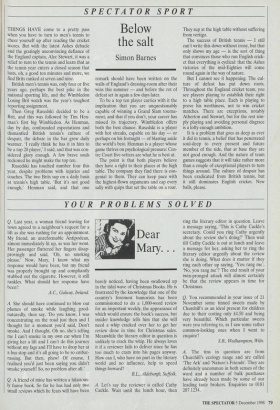SPECTATOR SPORT
Below the salt
Simon Barnes
THINGS HAVE come to a pretty pass when you have to turn to men's tennis to cheer yourself up after reading the cricket scores. But with the latest Ashes debacle and the gratingly unconvincing defiance of the England captain, Alec Stewart, it was a relief to turn to the tennis and learn that as the tennis year enters a closed season that lasts, oh, a good ten minutes and more, we find Brits ranked at seven and nine.
British men's tennis was, only four or five years ago, perhaps the best joke in the national sporting life, and the Wimbledon Losing Brit watch was the year's toughest reporting assignment.
Then Greg Rusedski decided to be a Brit, and this was followed by Tim Hen- man's first big Wimbledon. As Henman, day by day, confounded expectations and dismantled British tennis's culture of despair, the debate in the bar grew daily warmer. 'I really think he has it in him to be a top 20 player,' I said, and that was con- sidered glory enough. A few brave souls reckoned he might make the top ten.
Rusedski has touched number four this year, despite problems with injuries and coaches. The two Brits sup on a daily basis at tennis's high table. 'But it's not good enough,' Henman said, and that one remark should have been written on the walls of England's dressing-room after their wins this summer — and before the rot of defeat set in again a few days later.
To be a top ten player carries with it the implication that you are unquestionably capable of winning a Grand Slam tourna- ment, and that if you don't, your career has missed its trajectory. Wimbledon offers both the best chance. Rusedski is a player with hot streaks, capable on his day — or perhaps on his fortnight — of blasting aside the world's best. Henman is a player whose game thrives on psychological pressure: Cen- tre Court five-setters are what he is best at.
The point is that both players believe they have a right to their places at the high table. The company they find there is con- genial to them. They can keep pace with the highest-flown arguments and cap every sally with quips that set the table on a roar. They sup at the high table without suffering from vertigo.
The success of British tennis — I still can't write this down without irony, but that only shows my age — is the sort of thing that convinces those who run English crick- et that everything is cyclical: that the Ashes victories of the mid-Eighties will come round again in the way of nature.
But I cannot see it happening. The cul- ture of defeat has put down roots. Throughout the England cricket team, you see players playing to establish their right to a high table place. Each is playing to prove his worthiness, not to win cricket matches. There are exceptions, notably Atherton and Stewart, but for the rest sim- ply playing and avoiding personal disgrace is a lofty enough ambition.
It is a problem that goes as deep as ever it did in tennis, a belief that has penetrated soul-deep to every present and future member of the side, that at base they are not good enough. And the nature of team games suggests that it will take rather more than a couple of exceptional players to turn things around. The culture of despair has been eradicated from British tennis, but it still dominates English cricket. New balls, please.


















































































 Previous page
Previous page